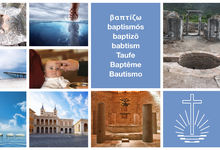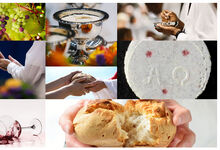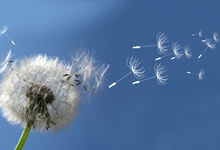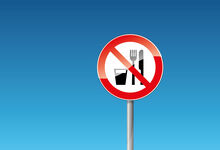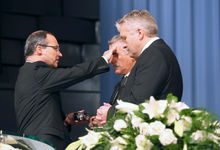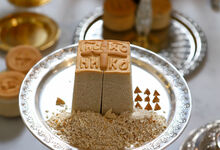The sacraments (65): On earth as it is in heaven
Acts in this world for the beyond. Why would this even be necessary? Jesus Christ Himself set the example by coming into this world to bring salvation to the living and the dead. This also marks the nature of the sacraments.

The sacraments are causally linked to the incarnation of God in Jesus Christ. “Salvation in the sacraments is founded upon the incarnation, sacrificial death, and resurrection of Jesus Christ, as well as the sending and activity of the Holy Spirit” (Catechism of the New Apostolic Church, CNAC 8).
Like the Protestant and Catholic Churches, the New Apostolic Church teaches that Jesus instituted the sacraments, and is therefore their master and origin. After His resurrection, Jesus commissioned the Apostles to dispense the sacraments. The sacraments—and this is one of the fundamental positions of the New Apostolic faith—are necessary to enter into a new relationship with God, to receive salvation in Christ, and to be numbered to the bridal congregation.
Salvation is acquired on this earth
The incarnation of God in Jesus Christ occurred within history. It took place at a specific time and place. It occurred “while Quirinius was governing Syria” (Luke 2: 2), which is Palestine today.
It is not any different with the death of Jesus, which Christians believe to be a central event of salvation. Jesus “suffered under Pontius Pilate, was crucified, died, and was buried” we can read in the Apostle’s Creed and in the New Apostolic creed.
Salvation was created by Jesus on earth, but it has universal validity and applies to the creation, namely to things on earth and things in heaven (Colossians 1: 20). This is why in New Testament times people were baptised for the dead (1 Corinthians 15: 29).
Sacraments reflect the nature of Jesus
In a certain way, the sacraments reflect the nature of Jesus:
- Jesus’ human nature is visible, His divine nature is hidden. According to His human nature, Jesus is true man and was created. According to His divine nature, He is true God and is not created.
- We also find the structure of the doctrine of Hypostatic Union (His being both fully God and fully man) in the sacraments, which have a visible and material side, and an invisible and immaterial side. They refer to the earth, because the water, wine, and bread belong to it, and they refer to heaven, because in them the salvation of the eternal God is imparted.
The structural relationship between the sacraments and the incarnation of God in Jesus Christ is particularly evident in Holy Communion. The Catechism states that in Holy Communion the bread and wine correspond to the human nature of Christ, and the body and blood correspond to the divine nature of Christ ((CNAC 8.2.12).
Sacraments impart salvation
Those who wish to receive salvation therefore need to receive the sacraments, which however always have a secular earthly aspect. The New Apostolic Church teaches: “Just as Jesus Christ brought His sacrifice on earth, salvation is also imparted through the Apostles on earth. Since sacraments always have a visible component, they can also only be performed in the visible realm. The effect of the sacraments as essential elements in imparting salvation is the same for both the living and the dead” (CNAC 9.6.3).
Gathering the living and the dead
An important aspect of the apostolate is the gathering of the bridal congregation and its preparation for the return of Christ. Our Church is driven by the conviction that the bridal congregation must be sought and gathered not only from among the living but also from among the dead.
So that this mission can be accomplished, it is necessary that the sacraments are also administered to the dead. Those who have been reborn out of water and Spirit, in other words, those who have been baptised and sealed and who have been strengthened through Communion, are called and numbered to the bridal congregation and are to proclaim the gospel in the kingdom of peace.
Photo: Antony Weerut - stock.adobe.com
Article info
Author:
Date:
Keywords:
Reinhard Kiefer
18.10.2022
sacraments,
divine services for ministers



